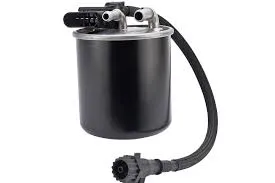Diesel engines have multiple fuel filters because incredibly small particles must be filtered out of the fuel before it is injected into the engine. This is true whether diesel is at work in a mine, on the water, in a field, or on the road.
The debris a diesel equipment filter catches is sized in micrometers, also called microns. For context, a single grain of salt is 100 microns. The particles filtered by a diesel fuel filter range anywhere from 3 to 15 microns, depending on the type of diesel fuel filter and its location in the engine.
What Are the Two Types of Fuel Filters?
There are two types of fuel filter in a diesel engine: primary filter (pre-filter) and secondary filter. These two filters are at different locations in the fuel system, and they serve different layers of protection.
- The primary filter is usually located between the fuel tank and the fuel pump. This filter cleans out any particles sized 10-15 microns before the diesel goes into the fuel pump to be sent up the line to the injectors.
- The secondary filter is usually located in the engine, right before the fuel enters the injectors. This filter cleans out any particles sized 3-5 microns, as a last line of precision defense.
Fuel Filter Element diesel engine fuel filters 23390-0L070 23390-0L090 for HILUX
Function of Fuel Filter in a Diesel Engine
Why do diesels have two fuel filters? As mentioned above, each is designed to catch part of the range of debris that needs to be filtered out. Without fuel filters, particles of contaminants like rust or dirt can compromise system performance. There are a number of components that benefit from filtration:
- Protecting the Fuel Injector: These components spray a fine mist of air and diesel fuel into the throttle body or each individual cylinder. Even a tiny speck of dirt or rust can stall these parts.
- Protecting the Fuel Tank: If fuel stands in the tank for a while before using, it may need to be recirculated through a filter to prevent bacteria formation. This remixing also gives the chance for any water mixed in with the fuel to stay integrated.
- Protecting the Fuel Pump: The fuel pump moves the diesel from the tank to the injectors. Depending on the type of machinery, the fuel pump might be controlled electronically by the injectors. Or, in mechanical systems the pump is operated by belts or chains attached to the engine, and pressurized with a carburetor.
- Protecting Tubes & Fuel Lines: Whether metal or rubber, tubes and lines also suffer wear and tear from fast-moving debris. Filters protect from slow leaks and sudden ruptures.
Diesel engine fuel systems operate at incredibly high pressures. If small particles are not filtered out, they travel at a velocity similar to a sandblaster, nicking away at metal or rubber over time. If filters are not high quality and long lasting, owners and operators can spend a fortune changing filters as often as needed to offset the low-quality filter performance. And it only takes one incident of filter failure to compromise an entire fuel system and lead to costly repair demands, unplanned downtime, and more.
What Causes Diesel Fuel Filters to Wear Out?
Diesel fuel filters get gunked up by two other substances found in diesel fuel, asphaltene and diesel paraffin wax. Asphaltene is a particle smaller than either fuel filter is designed to catch. Asphaltene isn’t harmful to the fuel injection system, but it still catches on the fibers of the filters and forms residue on the filter over time. Diesel fuel also contains paraffin wax which can solidify out of the fuel as the temperature changes. This clogs fuel filters over time.



